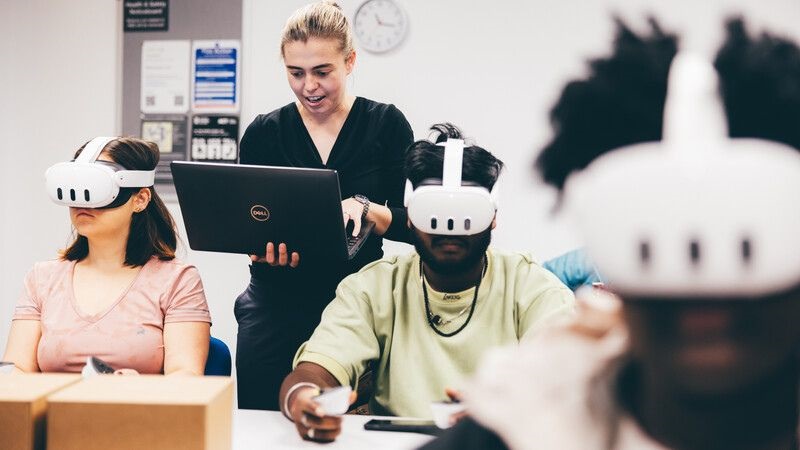UCAS code: P043435
Start dates: May 2026 / September 2026 / January 2027
Full time: 1 year or 2 years in sandwich mode which includes one year's full-time paid supervised industrial work experience (a work placement). Sandwich mode is available for all intakes.
Location: Headington
School(s): Oxford Brookes Business School
Overview
This accredited course will prepare you for a successful international career with either a commercial or not-for-profit organisation. Our course is uniquely structured, linking theory and practice, so that you will study all aspects of business management in an integrated way. Our Module in the Practice of Business and Management combines different functional areas (for example Marketing, Operations and Finance) so that this mirrors the way that real world problems are solved in organisations.
You can specialise by choosing optional modules in:
- Understanding Consumer Behaviour
- Sustainable Global Marketing Strategy
- The Practice of Data Analysis
- Business Intelligence
- Procurement and Supply Chain Management
- Group Consultancy Project
- Corporate Finance Concepts
- Financial Markets and Institutions
You can also choose to study two modules from different pathways.
Why Oxford Brookes University?
-
Learn from experts
Professionally experienced tutors, and guest entrepreneurs and business innovation experts.
-
Choose your specialisms
You can choose to follow a specialist pathway with optional modules offered in: Sustainable Global Marketing Strategy, Data Analytics, Supply Chain Management, Corporate Finance.
-
Employability skills
Build your analytical and solution focussed skills through international case studies.
-
Real world experience
Take part in Business Challenge Week and utilise your knowledge and practical experience to work with a business and address a challenge within the organisation.
Course details
Start this course in January or September
You can start this course in January if a September start doesn't suit you or is not currently offered for this course.
If you start in January you will study a range of modules between January and May. During the summer months of June, July and August you will study further modules and begin work on your dissertation. Between September and December you will complete your final modules and focus on your dissertation.
Study modules
In addition to your modules, you have the option to undertake a paid industrial work placement which can help you gain relevant industry experience and develop transferable skills such as communication, teamwork and problem solving. An industrial work placement can help you decide on your long-term career objectives and may lead to a job offer after graduation (would require visa sponsorship for international students). You will have access to opportunities at a range of UK-based companies of all sizes, from micro firms to Multinationals.
This enhanced offer complements our employability-focussed curriculum, and a student experience designed to prepare you for a range of future careers, including:
• Course specific workshops
• Personalised CV, cover letter and LinkedIn preparation
• Professionalism in communicating with employers
• Industry specific employment guides
• 1:1 counselling and mentoring
• Access to guest employers and speakers
Please note: As our courses are reviewed regularly as part of our quality assurance framework, the modules you can choose from may vary from those shown here. The structure of the course may also mean some modules are not available to you.
Research
Business School academics explore core issues facing contemporary societies, ranging from refugee entrepreneurship and internationalisation to sustainable tourism, security and the changing world of work and organisations including the impact of artificial intelligence. We address questions such as:
- What characterises the interconnections of trade, transportation and technologies?
- How do we organise for security?
- How can social media address well-being and social isolation?
- How can individuals be happier and navigate the increasingly complex world of work?
We also have an expertise in Coaching and Mentoring as well as in Diversity (such as examining pay gaps and gender and spin-outs) and as students, we are always keen to include you into our projects where possible.
Please visit our research pages to learn more about the three research centres @ /business/research/. Being a masters student at OBBS offers plenty of opportunities for you to be a part of our research culture.

Careers
You will graduate with highly relevant knowledge as well as practical experiences on how to manage different functional units in organisations.
Many of our graduates find managerial positions at a wide range of organisations, including:
- companies producing fast moving commercial goods
- consultancy firms
- financial institutions
- retail giants
- charities
- SMEs
Examples of these employers include:
- Amazon
- IBM
- Deutsche Telekom
- Deloitte, KPMG, PwC, EY
- Oxfam
- BASF Group
- Kautex Unipart
- Raiffeisen Bank
- Revolution Insurance
- American Business Conferences
- Consilio Global
- Or return to their family business
Student profiles
Our Staff
Dr Doaa Althalathini
I teach at the undergraduate and postgraduate levels in the areas of entrepreneurship, social enterprise, innovation, and research methods.
Read more about DoaaDr Gabor Lukacs
Gabor works as liaison manager with some of our esteemed international partners and professional and accrediting bodies, and teaches on several business and management modules.
Read more about GaborJohn Bancroft
John is currently a module leader across a number of undergraduate and postgraduate modules. He is also a subject coordinator for the postgraduate Business and Management MSc programmes.
Read more about JohnRelated courses
Entry requirements
Specific entry requirements
A minimum of a second class honours degree (2:2) in any academic discipline, or equivalent overseas degree from a recognised institution or equivalent professional or other qualification.
Applicants who possess a diploma rather than a degree may be eligible for entry provided they have compensatory work experience and can demonstrate career development.
This course attracts students from a wide range of backgrounds and nationalities. Applications are welcome from those in work and seeking continuing professional development.
Entry will also be subject to one satisfactory reference (academic).
If you’re considering submitting an application for this course, but you have more than three years of relevant work experience, why not consider applying for our Oxford Brookes Global MBA (Master of Business Administration) course? Find out more about our MBA here.
Please also see the University's general entry requirements.
English language requirements
If English is not your first language you will need to satisfy the university's English language requirements:
- IELTS minimum level 6.0, (with a minimum of 6.0 in reading and writing, and 5.5 in listening and speaking)
- if you have completed your undergraduate degree in the UK (at least one full year of study) you will automatically meet our English language requirements
Please also see the University's standard English language requirements.
Pathways courses for international and EU students
We offer a range of courses to help you meet the entry requirements for your postgraduate course and also familiarise you with university life in the UK.
Take a Pre-Master's course to develop your subject knowledge, study skills and academic language level in preparation for your master's course.
If you need to improve your English language, we offer pre-sessional English language courses to help you meet the English language requirements of your chosen master’s course.
English requirements for visas
If you need a student visa to enter the UK you will need to meet the UK Visas and Immigration minimum language requirements as well as the University's requirements. Find out more about English language requirements.
International applications
When you accept our offer, you agree to the conditions of acceptance. You should therefore read those conditions before accepting the offer.
Applications are also welcomed for consideration from applicants with European qualifications, international qualifications or recognised foundation courses. For advice on eligibility please contact Admissions: admissions@brookes.ac.uk
If you don’t achieve the required tariff points you can apply to join a foundation course, like Foundation in Business or an international foundation course to help to reach the required level for entry onto this degree.
Credit transfer
Terms and conditions of enrolment
When you accept our offer, you agree to the Terms and Conditions of Enrolment. You should therefore read those conditions before accepting the offer.
International qualifications and equivalences
How to apply
Application process
Tuition fees
Questions about fees?
Contact Student Finance on:
Tuition fees
The full-time fees quoted are for the taught Year 1. Fees will be charged for the placement year in Year 2 and are available on request from finance-fees@brookes.ac.uk.
The following factors will be taken into account by the University when it is setting the annual fees: inflationary measures such as the retail price indices, projected increases in University costs, changes in the level of funding received from Government sources, admissions statistics and access considerations including the availability of student support.
How and when to pay
Tuition fee instalments for the semester are due by the Monday of week 1 of each semester. Students are not liable for full fees for that semester if they leave before week 4. If the leaving date is after week 4, full fees for the semester are payable.
- For information on payment methods please see our Make a Payment page.
- For information about refunds please visit our Refund policy page
Additional costs
Please be aware that some courses will involve some additional costs that are not covered by your fees. Specific additional costs for this course are detailed below.
Optional costs
| Additional costs | Amount (£) |
|---|---|
If you choose to participate in any additional, optional trips, you are responsible for any associated costs. |
£10-150 |
It’s your responsibility to cover print / binding costs where coursework submission is required. Please note that a lot of the coursework is now submitted online. |
From £30 |
| You may choose to purchase books to support your studies. Many books on our reading lists are available via the Library, or can be purchased secondhand. | £20-60 per book |
Accommodation fees in Brookes Letting (most do not include bills) |
£107-301 per week |
Accommodation fees in university halls (bills included, excluding laundry costs) |
£139-248 per week |
| CMI student membership | £330 |
Graduation costs include tickets, gowning and photography. Gowns are not compulsory but typically students do hire robes, starting at £41. |
Typically £0-200 |
International Business in Practice Study Trip module (inc. accommodation for seven nights, insurance, company visits and group transportation for all activities). This fee did not include international airfare, visa application fee (if relevant), dinners and activities during your free time. |
£2250-2500 |
Students are responsible for their own travel to and from university for classes. For the 2025/26 academic year, the University is introducing an alternative subsidised travel offer for all students with further information on our Travel webpages. |
From £10 |
Funding your studies
Financial support and scholarships
Featured funding opportunities available for this course.
All financial support and scholarships
Programme changes:
On rare occasions we may need to make changes to our course programmes after they have been
published on the website. For more information, please visit our
changes to programmes page.



